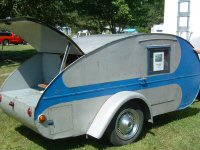Electric Gurus will this work ok ?
3 posts
• Page 1 of 1
Electric Gurus will this work ok ?
Any Comments appreciated. Thanks

- iflybye
- Teardrop Inspector
- Posts: 7
- Images: 20
- Joined: Wed Oct 14, 2009 11:58 pm
In Theory
It looks ok to me. You only need one single pole double throw relay, not two individual relays to do the switching you want. Also, one relay would be fail safe to keep the power supply and charger from ever being in the circuit at the same time. You've put a lot of thought and will have a fair amount of materials in this. However, I see no need to go to all this effort. You have the battery why not use it?
Here is a previous string on converters and battery chargers.
http://tnttt.com/viewto ... highlight=
And what I wrote:
I looked at the web site for one of the converters recommended. Seems like they are pretty expensive. I owned a boat for years and had a marine battery charger that would keep 4 batteries properly charged at dockside and allowed use with the charger connected and powered up.
I don't see any need for a converter that can power 20 or more amps when you have a good deep cycle battery in the circuit. You (or at least me) rarely use the full capacity of these units. A 10 amp charger and with the battery in the circuit to handle those short periods of time when you do need a bit more power always worked for me on the boat. In fact, although I had three batteries on the boat, my pattern was to only keep one "on line" while away from the dock. The other two were for EMERGENCIES only (a wise habit when you can't hand crank or push start your diesel engine, IMHO). I sometimes went for a two or three days at a time only running the engine for about 20 minutes in the evening to generate enough hot water (the hot water was created using a heat exchanger from the cooling system on the engine) for showers! If you keep it simple (we only used a few lights, occasionally the VHF radio, no appliances save the on demand water pump, the solenoid for the propane (a safety feature on a boat), and in those days a small crt TV and vhs player) and NEVER fully discharged the one battery that I had switched into the main power bus.
I'd recommend a marine charger (good ones that will multi stage charge 2 separate batteries are about a hundred bucks) that can keep your batteries up at home and in a campground with a/c. Of course a good solar panel will keep your battery up when a/c is not available but might not provide enough power (depending upon the size of your panel and how many amp hours you use each day) for extended use (week or maybe more) but would probably keep you going for several days before your battery would be discharged and by then you'd probably have your trailer connected to your tow vehicle and charging the battery on the go anyway.
In short, if you keep it simple, don't try to run fans for extended periods (or heaters or a/c units) a 100 amp hour battery and 5 or 6 amps of charging current for a few hours each day would work just fine (IMHO and based upon my experince with a cruising sailboat).
There you have it (again), the world according to Gus.
Cheers,
Gus
Here is a previous string on converters and battery chargers.
http://tnttt.com/viewto ... highlight=
And what I wrote:
I looked at the web site for one of the converters recommended. Seems like they are pretty expensive. I owned a boat for years and had a marine battery charger that would keep 4 batteries properly charged at dockside and allowed use with the charger connected and powered up.
I don't see any need for a converter that can power 20 or more amps when you have a good deep cycle battery in the circuit. You (or at least me) rarely use the full capacity of these units. A 10 amp charger and with the battery in the circuit to handle those short periods of time when you do need a bit more power always worked for me on the boat. In fact, although I had three batteries on the boat, my pattern was to only keep one "on line" while away from the dock. The other two were for EMERGENCIES only (a wise habit when you can't hand crank or push start your diesel engine, IMHO). I sometimes went for a two or three days at a time only running the engine for about 20 minutes in the evening to generate enough hot water (the hot water was created using a heat exchanger from the cooling system on the engine) for showers! If you keep it simple (we only used a few lights, occasionally the VHF radio, no appliances save the on demand water pump, the solenoid for the propane (a safety feature on a boat), and in those days a small crt TV and vhs player) and NEVER fully discharged the one battery that I had switched into the main power bus.
I'd recommend a marine charger (good ones that will multi stage charge 2 separate batteries are about a hundred bucks) that can keep your batteries up at home and in a campground with a/c. Of course a good solar panel will keep your battery up when a/c is not available but might not provide enough power (depending upon the size of your panel and how many amp hours you use each day) for extended use (week or maybe more) but would probably keep you going for several days before your battery would be discharged and by then you'd probably have your trailer connected to your tow vehicle and charging the battery on the go anyway.
In short, if you keep it simple, don't try to run fans for extended periods (or heaters or a/c units) a 100 amp hour battery and 5 or 6 amps of charging current for a few hours each day would work just fine (IMHO and based upon my experince with a cruising sailboat).
There you have it (again), the world according to Gus.
Cheers,
Gus
The opinions in this post are my own. My comments are directed to those that might like an alternative approach to those already espoused.There is the right way,the wrong way,the USMC way, your way, my way, and the highway.
"I'm impatient with stupidity. My people have learned to live without it." Klaatu-"The Day the Earth Stood Still"
"You can't handle the truth!"-Jack Nicholson "A Few Good Men"
"Some people spend an entire lifetime wondering if they made a difference in the world. The Marines don't have that problem"-Ronald Reagan
"I'm impatient with stupidity. My people have learned to live without it." Klaatu-"The Day the Earth Stood Still"
"You can't handle the truth!"-Jack Nicholson "A Few Good Men"
"Some people spend an entire lifetime wondering if they made a difference in the world. The Marines don't have that problem"-Ronald Reagan
-

eamarquardt - Silver Donating Member
- Posts: 3179
- Images: 150
- Joined: Sat Nov 11, 2006 11:00 pm
- Location: Simi Valley, State of Euphoria (Ca)




